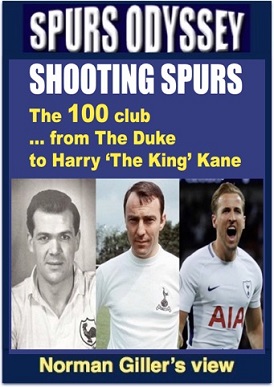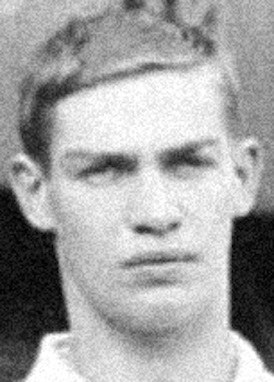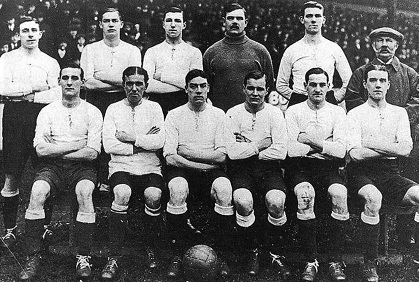NORMAN GILLER’S SPURS ODYSSEY BLOG No 311
Submitted by Norman Giller

Thank you for joining us here at our Spurs sanctuary, far away from nasty viruses and news so gloomy that you think the only thing worse is Arsenal winning the Champions League, the Premiership title and the FA Cup all in the same season. You have to laugh, or go mad in this new planet in which we are suddenly having to learn to survive.
Our Spurs Odyssey guru Paul H. Smith and I have decided the only safe and rewarding place to exist at the moment is in a pleasant past where we remember our old heroes who brought us together as Tottenham disciples.
The enforced standstill in the season gives us the chance to remember and revere the achievements of Lane Legends. So – starting today here on the Spurs Odyssey stage – we are going to serialise my latest book lauding the past performances of our goal-grabbing players.
The book is called Shooting Spurs, and focuses on every player in Tottenham’s history since the formation of the club in 1882 who has scored more than 50 League and Cup goals.
Cliff Jones, 159-goal Welsh wing wonder, set the mood with an introduction last week. Now we kick off with the first of the members of Tottenham’s exclusive 100 club …

BILLY MINTER
Born Woolwich, South East London 16 April 1888
Goals in 224 matches: 101
Died Edmonton, North London 21 May 1940
Playing career span with Spurs: 1908-1920
BILLY MINTER 101 GOALS
BILLY MINTER was the first player to join Tottenham’s 100 Football League and FA Cup Goals Club and later became (along with Glenn Hoddle) one of only two centurions to go on and manage Spurs, much to his regret. He gave heart and soul to serving the club to the point where it affected his health.
Born in the then Gunners' territory of Woolwich, Billy started his playing career as an amateur with first Norwich and then at what was his local South London club, the Arsenal. He was based at Aldershot as a boy soldier and bought himself out at the age of 19 when he turned professional with Reading after failing to clinch a first-team place with the Woolwich club.
Tottenham’s Berkshire-based scout recommended him to then Spurs manager Arthur Turner, who splashed out £500 to buy both Minter and Geordie full-back Ernie Coquet from the Biscuitmen, and in their first full season together in 1908-09 they helped Tottenham win promotion to the First Division as runners-up to Bolton Wanderers. This was Tottenham’s first campaign in the Football League after dominating the Southern League, even winning the then premier competition, the FA Cup, in 1901.
Billy scored 101 goals in 263 Football League and FA Cup games for Tottenham and was a fleet-footed forward who could disrupt the tightest defence with his speed and shooting power. He took over as the main marksman from legendary amateur star Vivian Woodward, who moved on to Chelmsford and then Chelsea while captaining Great Britain to Olympic glory in 1908 and again in 1912.
Top club scorer for three successive seasons, Billy did more than most to keep Tottenham in the First Division before the depressing relegation season of 1914-15. His 95 goals in 243 League games was a club record until Jimmy Dimmock surpassed it in 1930. He also scored six goals in FA Cup ties to lift himself into Tottenham's then one-man 100 club. (Player-manager John Cameron beat Billy to the 100-goal mark but never played in the Football League).
Minter’s playing career was interrupted at its peak by the outbreak of the First World War, and he served as a sergeant with the Tottenham Royal Engineers, winning a Meritous Service medal. Recovering from minor wounds received in battle, he was appointed club captain after finishing his military duties, but had lost his pre-war snap. Along with all fair-thinking people, Billy was astonished to find his former club "Woolwich" Arsenal now not only down the road from Tottenham at Highbury but also in the First Division, while Spurs were kicking off the first post-war season back in the Second Division.
A slight detour here, while I explain how and why Arsenal were feasting at the top table while Spurs were living on crumbs in the Second Division, a story that rankles with Tottenham devotees to this day.
Tottenham had been relegated in bottom place in a 1914-15 season that most sensible people felt should have been abandoned. It seemed obscene to be playing football while thousands were dying on the battlefields in France and Belgium.
Scot Peter McWilliam had been the pre-war manager and resumed control at White Hart Lane as the unspeakable horrors of the First World War were laid to rest beneath a riot of celebration that turned the 1920s into what F. Scott Fitzgerald concisely and colourfully summed up as The Jazz Age.
The Football League roared back into action nine months after the November 11 1918 Armistice, boasting of being "bigger and better" than ever. They expanded from 40 clubs to 44, with the First and Second Divisions now made up of 22 clubs each.
The shock, particularly for Spurs, was that the restructured First Division included their new-to-North London neighbours Arsenal – but not Tottenham. It was naturally assumed – with the extra places available – that the teams that finished in the last two places in the 1914-15 season, Chelsea and Tottenham, would automatically retain their First Division status, with Derby and Preston promoted as the top two teams in the Second Division to make up the 22 clubs.
But nobody took into account the Machiavellian manoeuvres of Arsenal chairman Sir Henry Norris, a sort of small-time Septic Blatter.
He secretly negotiated behind the scenes and behind the backs, and had powerful Liverpool chairman and League president John McKenna – nicknamed ‘Honest John’ – giving him surprisingly strong support.
Despite finishing only fifth in the Second Division in 1914-15, it was Arsenal who were promoted along with Chelsea, Derby and Preston. The team that lost out was Tottenham, and all these years later it still irritates, like an itch that will not go away and the more you scratch it the worse it gets.
Tottenham chairman Charles Roberts, who always apparently played by the book, was speechless, even apoplectic. Privately, the Spurs directors and – more vociferously, the supporters – were wondering just how ‘Honest’ John McKenna was. Goodness knows what he would have been called had social cyberspace networks like Facebook and Twitter been around in those days. I think the internet might have gone into meltdown.
It was not only Tottenham who felt left out in the cold. The stench carried all the way up through the Black Country and to the coalfields of Yorkshire. Wolves and Barnsley had finished third and fourth in the old Second Division, and they could not fathom how Arsenal had managed to leapfrog them without a ball being kicked.
Norris, the man who stubbornly transferred Arsenal to Highbury from Woolwich against the wishes of most people in 1913, got the comeuppance wished on him by Tottenham. In 1927 the Football Association suspended him and a fellow director, and the club was censured for illegally inducing players, including the great Charles Buchan, to join Arsenal.
Sir Henry became embroiled in a huge libel case against the FA and the Daily Mail, who alleged he had been using Arsenal funds to pay his personal expenses and the wages of his chauffeur. It was the FIFA-gate of its time.
The newspaper produced evidence that he had pocketed what was then a whopping £125 from the sale of the club team bus, endorsing the cheque with the forged signature of manager Herbert Chapman, and paying the money into his wife’s account.
The cheers in Tottenham when he lost the case could no doubt be heard all the way to the Law Courts. Norris, whose ancestor had been beheaded for – euphemistically – flirting with Anne Boleyn, fitted the image of a Victorian villain, complete with a huge twirling moustache and a monocle that distorted his features.
A former Conservative MP, Mayor of Fulham and chairman at Craven Cottage when he tried to merge the club with Woolwich Arsenal, Norris was drummed out of football for the rest of his life.
Arsenal, the team he talked and tricked into the First Division, have been at the top table ever since – without ever earning the right to a place on the field of play.
These shenanigans gave Tottenham the motivation to win a First Division place through playing rather than politicking, and in Peter McWilliam they had the man with a plan and the players to implement it. The on-fire Lilywhites ran away with the Second Division championship in 1919-20 with an avalanche of 102 goals and a six-point advantage over runners-up Huddersfield (this, of course, in the days of two points for a win).
Billy Minter decided to hang up his boots when manager McWilliam picked the talented Jimmy Banks ahead of him. He switched to club trainer in 1921 but was promoted beyond his comfort zone in February 1927 when the hugely capable and influential McWilliam returned to the North East, where he had been idolised as a Newcastle player. Billy inherited a team that was past its sell-by date, with players weighed down by creeping age and loss of form and confidence following their heady performances in the immediate post-war years.
But nobody could have predicted their sensational collapse in the 1927-28 season. After thirty-five games they were sitting fairly comfortably in seventh place in the First Division. Then came a slide that was a mountain avalanche, and Billy Minter looked on helplessly like a sherpa caught in the rock fall.
In the last seven games they gathered only three points and the shell-shocked team were relegated in next to bottom place with 38 points. Can you imagine what they would have made of that on social media!
It was no consolation for Tottenham to hear from the statisticians that this was the highest total in the two-points-for-a-win era with which a First Division team had gone down. The competition was so close that Derby County, with only six more points, were fourth in the final table. Neither was it any solace that the team that went down with them in bottom place was the Middlesbrough side managed by the extravagantly paid former Tottenham boss McWilliam.
He was the highest earning flop in the game during that era, and after his hero worship at St James' Park and White Hart Lane he suddenly found out what it was like to be given merciless stick by the Ayresome Park fans.
Down in the Second Division Spurs had five seasons of mediocrity that were more about taking part than winning. It was a period of deep gloom at the Lane, and poor Billy Minter crumbled under the pressure and had to take leave of absence. Depression was his constant companion.

The 1913 Spurs: Back row, Walter Tattersall, Billy Minter, Arthur Grimsdell, John Joyce, Charlie Rance, groundsman John Over (who laid the first Test match pitch at The Oval); Front: Fred Webster, Findlay Weir, Tom Collins, Jimmy Cantrell, Bobby Steel, Bert Middlemiss.
To their credit, the club did not just let their great servant disappear into oblivion. They insisted that he stay on at the club to which he had given so much and found him a non-pressure job as assistant secretary to Arthur Turner.
Billy’s health deteriorated and the club mourned his death in May 1940 at the age of only 52. He died just weeks before the drama of the Dunkirk evacuation, and Arthur Turner said on behalf of the club:-
"Tottenham mourn the loss of one of their most loyal employees. He served the club in several roles, including as an outstanding player, trainer, chief scout and as a conscientious manager. Right up until his passing he continued to serve the club he loved as a hard-working assistant secretary. He was one of our family, and he will be sadly missed."
In the annals of Tottenham’s history, Billy Minter deserves to be remembered as a great servant to the Lilywhites, who should never have been given the huge burden and responsibility of management. Most of all we remember him here as the first member of the Tottenham 100 Club, a true Shooting Spur.
Next week: The ‘Bomber’ Bliss Blitz

We are carrying on with our weekly Spurs Odyssey Quiz League, and hope you continue to take part. Question No 34 in this 2019-20 SOQL season:
Who was released by Manchester City without playing a game, scored for England in the 2018 World Cup finals and from which club did he join Tottenham?
Please email your answer to me at SOQL34@normangillerbooks.com.
Deadline: midnight this Friday. I will respond to all who take part.
The rules are the same as in previous seasons. I ask a two-pronged question
with three points at stake. In the closing weeks of the competition I break the
logjam of all-knowing Spurs-history experts with a tie-breaking poser that is
based on opinion rather than fact.
Last week’s SOQL question: Who was born to a German mother, is a member of the Spurs ‘100’ goals club, has played in Switzerland and against which team did he score two goals in the first leg of a UEFA Cup final?
The answer: Martin Chivers, who scored two goals in the first leg of the 1972 UEFA Cup final against Wolves at Molineux. Coach Eddie Baily had been giving him terrible verbal stick, and after his second goal – a screamer – he prostrated himself in front of the huge centre-forward in the dressing-room and said: “Okay, you win big man. Now walk all over me.” Skipper Alan Mullery clinched victory with the Tottenham goal in a 1-1 draw in the second leg, and he did a one-man lap of honour as thousands invaded the White Hart Lane pitch in jubilation.
This year’s prizes for the champion: a Harry Kane framed and signed photo, two books from my Spurs collection with autographs from Jimmy Greaves, Steve Perryman and Dave Mackay, and, most important of all, a framed
certificate announcing the winner as SOQL champion.
See you back here same time, same place next week. Carry On Regardless. COYS!
Top of page | Spurs Odyssey Home Page

